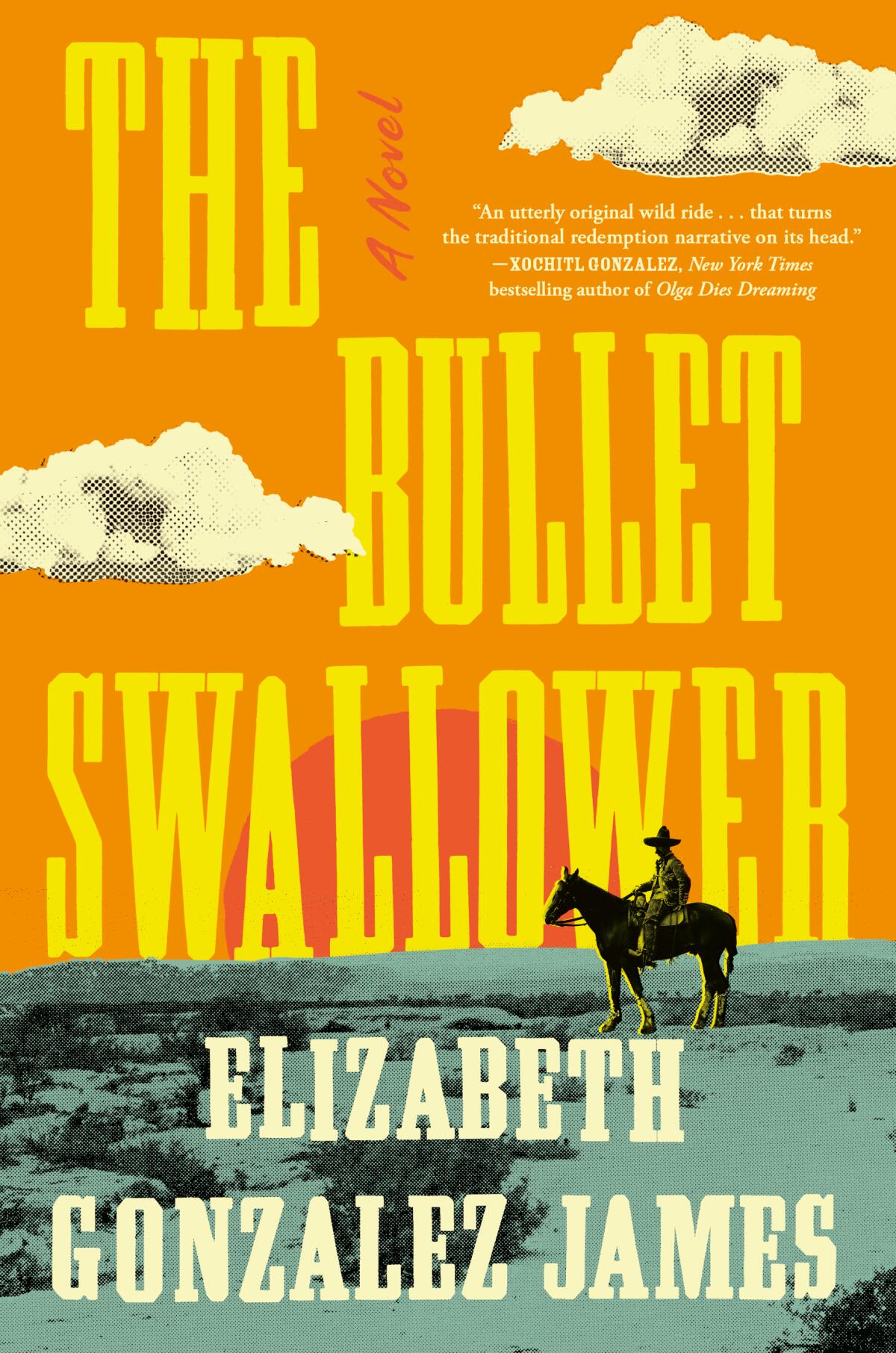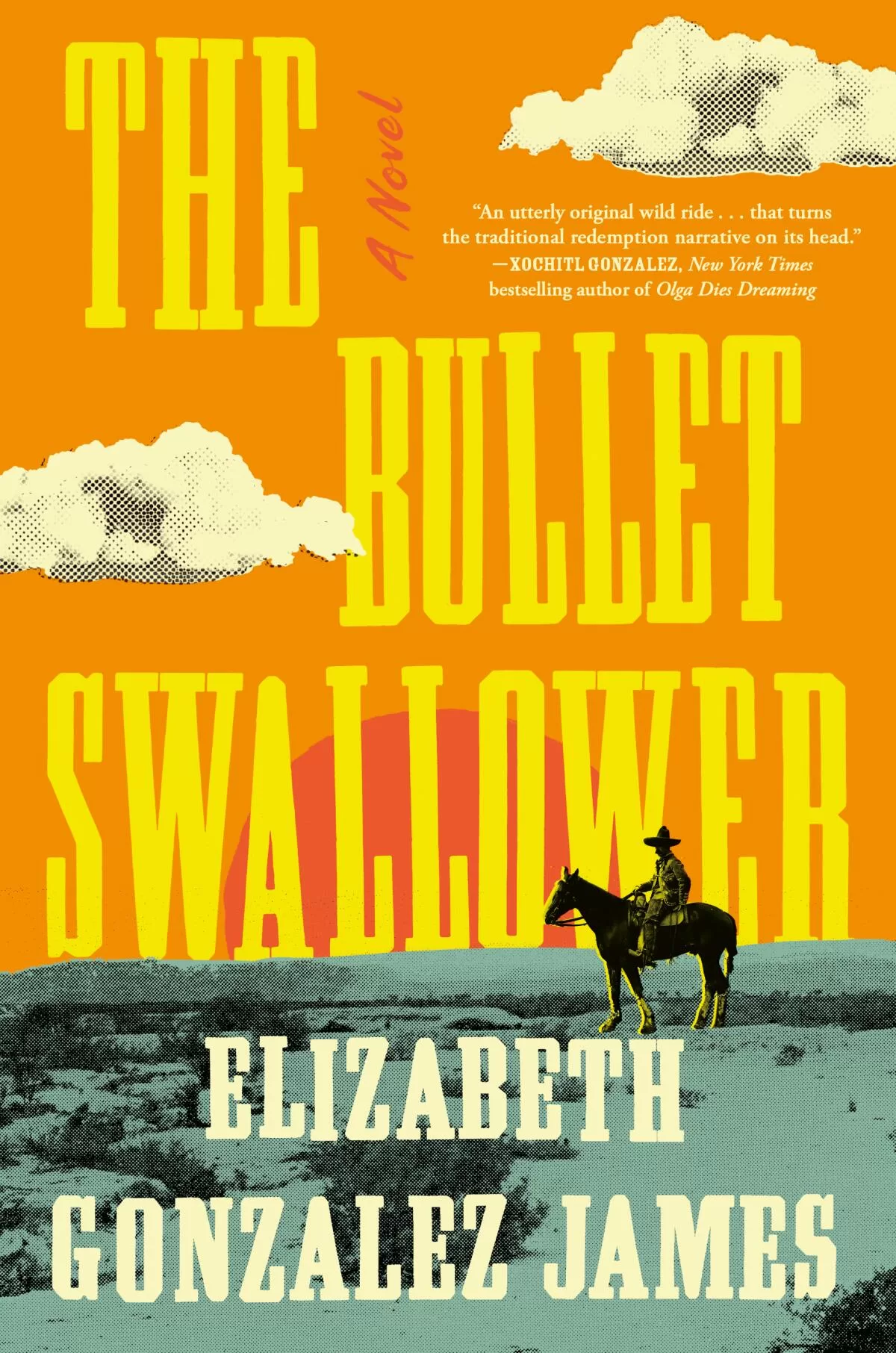Book Review
The Bullet Swallower
By Elizabeth Gonzales James
Simon & Schuster: 272 pages, $27
If you buy books linked on our site, The Times may earn a commission from Bookshop.org, whose fees support independent bookstores.
Early in Elizabeth Gonzalez James’ second novel, “The Bullet Swallower,” a rare-book dealer pays a surprise visit to a popular Mexican movie actor at his home in Mexico City. She’s come to deliver an ancient tome purportedly about his ancestors, and such moments usually launch a deep-dive into rich and exciting family lore. But the dealer mainly wants the thing off her hands, and the actor isn’t so sure he wants it either. Its pages smell “like rotting meat.” Books, history — yuck, who wants that?
The awkward, smelly exchange encapsulates what James does across the novel, which is to deliver the thrill of historical adventures while pushing us to ask what we, exactly, find so thrilling about them. The hero of the title comes straight out of gunslinger central casting: In 1895, Antonio Sonoro is the patriarch of a dusty stretch of land hugged by the Rio Grande on two sides — a mine collapse has caused the river to split biblically around the property. He has a fearsome reputation but is low on funds, a problem he wants to solve by robbing a train in Houston. “Questing como Don Quixote,” as his infuriated wife grumbles at him.
Antonio’s plan goes about as badly as possible. The moment he gets his hands on the riches (liquor, jewelry, artifacts), he’s discovered by the Texas Rangers — in the midst of one of their violent and bigoted rampages. Antonio’s good-hearted partner-in-crime is shot and killed; Antonio himself takes a bullet to the face but miraculously survives, setting him on the path to become El Tragabalas, the bullet-swallowing, vengeance-hungry folk hero.
Antonio is in terrible pain and badly deformed. Worse, he’s become a symbol of the duality of man: “The left half of his mouth was untouched, but the right half had disappeared altogether, the lips blasted away leaving two lipless halves that did not meet.” In some ways, Antonio spends much of the novel as a swashbuckling trope, navigating familiar cinematic scrapes. Knifeplay! Dashing onto moving trains! Dodging bullets! Wriggling out of ropes! Alligators! There are streetwise brothel madams, cat-and-mouse chases across the dusty plains, a Sancho Panza in the form of a louche British sharpshooter, a flash of lightning that reveals the cruel ranger’s face.

This is fun, and James means it to be. But she also delivers these moments with heaps of irony. Romanticizing all this bloodshed and vengeance only perpetuates it, she means to say; in a just world, it should repel our admiration.
Which brings us back to that stinking book. Antonio’s story is braided with that of his grandson, Jaime, who in 1964 is a film star on the order of Luis Aguilar. Once Jaime gets past the stench, the book — an 18th century tale of the Sonoro clan’s long history of evil — is grimly enchanting to him. Perhaps there’s a movie in the tale of El Tragabalas?
That kind of thinking is the devil’s work. Literally. Remedio, a grim reaper, occupies both parts of the book’s braided narrative, deciding to keep Antonio alive as a way to investigate the history of cruelty chronicled in the book — and wonder what might forestall it. “Remedio had the opportunity to watch and see, would the pallor disappear? Could the course reverse?” He’s skeptical. The ancient book insists on the perpetuity of “the iniquity of parents upon children and children’s children, upon the third and fourth generations.” Remedio himself says that “no man lives free from history.”
Perhaps, but we can choose to live free from mythologizing, James suggests. To take a bullet to the face and survive it is a terrible reality. (In an author’s note, James writes that her great-grandfather became a legend in South Texas and northern Mexico after being similarly wounded.) But to inflate that reality is a choice, and the choice has consequences. Antonio’s pursuit of vengeance — and belief in vengeance as his sole option — only encourages the Rangers to lay waste to multiple communities, scapegoating Mexicans for their own pillaging and killing, the better to rationalize their violent racism.
Remedio’s place in the story isn’t entirely persuasive, especially his intercession in Jaime’s family life; it’s not entirely convincing that a very busy harvester of souls would stop short with Antonio just because his family is a bit complicated. (What family isn’t?) Too concrete a presence to qualify as magical realism but too amorphous to root for or against, he resides in the story as a plot device with some sinister atmosphere sprinkled on top.
But the main point gets across. Like Antonio’s bifurcated face, like Antonio’s hometown that’s neither in Mexico nor in America, we all occupy liminal spaces, never clearly on one side or another. And because of that, we’re not obligated to adhere to the narratives we inherit. “The Bullet Swallower,” in that regard, is slyly ambitious, striving to pull off a trick nearly as tough as surviving a bullet to the head: to deliver old-fashioned, satisfying storytelling that critiques itself, insisting we move past those old fashions.
Athitakis is a writer in Phoenix and author of “The New Midwest.”
